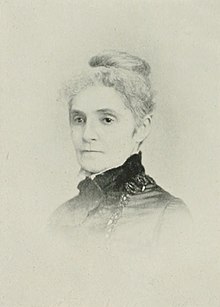Helen A. Manville (née, Wood; pen name Nellie A. Mann; August 3, 1839 – 1912) was an American poet and litterateur of the long nineteenth century.[1] Under the pen name of "Nellie A. Mann", she contributed largely for leading periodicals east and west, and obtained a national reputation as a writer of acceptable verse. At the height of her fame, she decided to stop using the pen name and assume her own. She succeeded in making both names familiar, virtually winning laurels for two cognomens, when ill-health required a pause in her literary work. A collection of her poems was published in 1875, under the title of Heart Echoes, which contained a small proportion of her many verses.[2]
Helen A. Manville | |
|---|---|
 | |
| Born | Helen Adelia Wood August 3, 1839 New Berlin, New York, U.S. |
| Died | 1912 Buenos Aires, Argentina |
| Resting place | La Crosse, Wisconsin, U.S. |
| Pen name | Nellie A. Mann |
| Occupation | poet, litterateur |
| Notable works | Heart Echoes |
| Spouse | Marvin Madison Monroe Manville |
| Children | Marion Manville Pope |
| Relatives | |
| Signature | |
Early years
editHelen Adelia Wood was born in New Berlin, New York, August 3, 1839. Her father was Col. Artemus Wood.[3] She inherited literary talent from her mother, several members of whose family won local celebrity, and who were connected with the Carys, from whom Alice and Phebe were descended, and also the house of Douglas, whose distinguished representative was Stephen.[4]
Accompanying her father as Helen Wood, she removed to the West at an early day, and there she obtained her education.[5]
Career
editFor many years, Manville's pen name was "Nellie A. Mann", under which she contributed to leading periodicals. Renouncing her pen name, she assumed her own, and in 1875, published a collection of her poems entitled, Heart Echoes,[6] which contained a small portion of her verse, for she had been a voluminous writer.[5][4]
Style and themes
editThe chief characteristics of her poetry are natural melody, smoothness of versification and exalted sentiment, the expression of a mind filled with refined and uplifting thoughts.[5] Her spirituality was pronounced, and an abiding faith in a supreme wisdom, whose dictations proceed from infinite love, carried many a message of comfort to sorrowing hearts, and inspired strangers to become her grateful friends. This quality of sympathy and understanding of others' trials and sorrows is peculiar to her verse and to the earnest sincere womanliness of the woman herself. [2]
Personal life
editAfter she married Marvin Madison Monroe “M.M.” Manville (1829-1904),[7] she lived in La Crosse, Wisconsin. She had one child, the poet, Marion Manville Pope.[3][4] Manville died in 1912 during a visit with her daughter in Buenos Aires, Argentina,[8] and was burled in La Crosse.[7]
Selected works
editBy Nellie A. Mann
edit- "Sunlight", Ballou's Dollar Monthly Magazine, 1868[9]
By Helen A. Manville
edit- Heart Echoes, 1875 (text)
References
edit- ^ American Publishers' Association 1914, p. 634.
- ^ a b Moulton 1892, p. 258.
- ^ a b Duzee 1902, p. 93.
- ^ a b c Willard & Livermore 1893, p. 492.
- ^ a b c White 1897, p. 523.
- ^ Adams 1904, p. 246.
- ^ a b Marquis 1928, p. 569.
- ^ Lois Stiles Edgerly (August 1995). "Helen Adelia Manville". Women's Words, Women's Stories: An American Daybook. New England Mobile Book Fair. p. 303. ISBN 978-0-88448-144-7.
- ^ ""Sunlight", By Nellie A. Mann". Ballou's Dollar Monthly Magazine. 27–28. Elliott, Thomes & Talbot.: 586 1868. Retrieved 2 February 2022. This article incorporates text from this source, which is in the public domain.
Attribution
edit- This article incorporates text from this source, which is in the public domain: Adams, Oscar Fay (1904). "Manville, Mrs. Helen Adelia [Wood]". A Dictionary of American Authors (Public domain ed.). Houghton, Mifflin. p. 246.
- This article incorporates text from this source, which is in the public domain: American Publishers' Association (1914). "Mannville, Mrs. Helen Adelia". Herringshaw's American Blue Book Of Biography (Public domain ed.). American Publishers' Association.
- This article incorporates text from this source, which is in the public domain: Duzee, Edward P. Van (1902). "Manville, Helen Adelia". Catalogue of Poetry in the English Language: In the Grosvenor Library, Buffalo, N.Y. (Public domain ed.). London, England: Grosvenor Library.
- This article incorporates text from this source, which is in the public domain: Moulton, Charles Wells (1892). "Helen A. Manville, by Jeannette Ward". The Magazine of Poetry and Literary Review. Vol. 4 (Public domain ed.). C.W. Moulton.
- This article incorporates text from this source, which is in the public domain: White, J.T. (1897). "MANVILLE, Helen Adelia (Wood)". The National Cyclopaedia of American Biography: Permanent series (Public domain ed.). J.T. White.
- This article incorporates text from this source, which is in the public domain: Willard, Frances Elizabeth; Livermore, Mary Ashton Rice (1893). "MANVILLE, Mrs. Helen Adelia". A Woman of the Century: Fourteen Hundred-seventy Biographical Sketches Accompanied by Portraits of Leading American Women in All Walks of Life (Public domain ed.). Moulton. p. 492.
Bibliography
edit- Marquis, Albert Nelson (1928). The Abridged Compendium of American Genealogy: First Families of America. Vol. 3. A.N. Marquis.
External links
edit- Works related to Woman of the Century/Helen Adelia Manville at Wikisource
- Works by or about Helen A. Manville at the Internet Archive